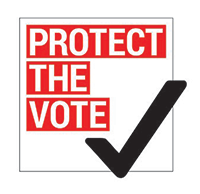With the 2018 midterm elections about four months away, conservative groups have stepped up pressure on election officials to remove allegedly ineligible voters from their lists. Since 2012, conservative activist groups have filed at least 17 federal lawsuits to force state or local officials to take more aggressive action in kicking voters off the rolls. That’s more than half of the federal purge-related litigation filed by private parties in that timeframe.
In theory, there is nothing wrong with scrubbing voting lists of people who are ineligible to vote because, for example, they have moved or are dead. But there is plenty wrong with sloppy or overly aggressive purging practices. And since every state but one requires voters to be on the pollbook in order to cast a ballot, too many unsuspecting voters may find themselves disenfranchised on Election Day.
Conservative groups who have filed suits so far include Judicial Watch, the American Civil Rights Union (ACRU), the Public Interest Legal Foundation (PILF), and True the Vote. Judicial Watch has an active lawsuit against the state of California and the County of Los Angeles. ACRU has an active lawsuit against Starr County and the state of Texas. PILF, headed up by a former member of President Trump’s now-disbanded “Voter Fraud” Commission, sent menacing letters to nearly 250 jurisdictions in 2017 threatening litigation if they did not clean up their voter rolls.
And these groups are getting results. Judicial Watch claimed success in Indiana, where they touted their 2012 lawsuit against the state as having “forced” Indiana to undertake more aggressive purge practices. More recently, Judicial Watch obtained a settlement with the state of Kentucky on purge practices. ACRU and PILF obtained settlements individually and jointly from jurisdictions in Mississippi, North Carolina, and Texas.
In Noxubee County, Mississippi (an impoverished, rural, majority-Black county in the eastern part of the state), the settlement resulted in more than 12 percent of the county’s registered voters being designated inactive — a status that could lead to removal from the rolls if two federal election cycles pass with no activity by the voter.
These efforts to force purges through the courts are occurring amid rising purge rates across the country and a shifting legal landscape. According to publicly available data published by the U.S. Election Assistance Commission and analysis in a forthcoming Brennan Center report, jurisdictions are removing more voters from the rolls than they were a decade ago.
But pro-voter groups are fighting back. Many, including the Brennan Center and our partner groups, use litigation to protect voters against improper purges. In response to PILF’s menacing and threatening letter campaign in late 2017, the Brennan Center and other civil rights groups contacted the same jurisdictions as PILF to arm them with legal analysis rebutting the inaccuracies in PILF’s missives. California Common Cause, represented by the Brennan Center, and other pro-voter groups have sought to intervene in defense of California election officials in litigation with Judicial Watch. And in Indiana, local branches of the NAACP and the League of Women Voters, represented by the Brennan Center, and other civil rights groups won a temporary halt to an Indiana law that would have illegally removed Hoosiers from voter rolls in the state. Even the recent loss before the Supreme Court in the case Husted v. A. Philip Randolph Institute, which challenged Ohio’s practice of beginning the purge process when a voter misses a single election, reaffirmed the protections that federal law provides to set real, meaningful limits against bad purges.
Victories in court are important, yet the broader struggle between pro-voter forces and those that would deprive voters of the franchise unfortunately rages on — with nothing short of our fundamental rights at stake.
If you are a voter who believes you’ve been improperly purged from the rolls, contact 866-OUR-VOTE and lodge a complaint with Election Protection.
  |
This post is part of the Brennan Center’s work to Protect the Vote in the 2018 midterm elections.Stay on top of the latest news and learn what you can do to make a difference by signing up for Brennan Center’s INSIDER newsletter. |
